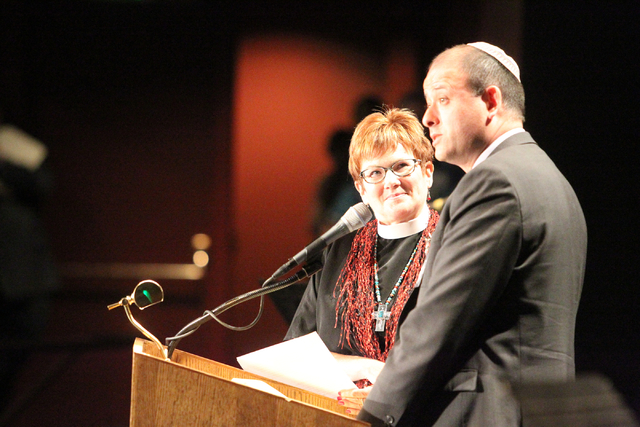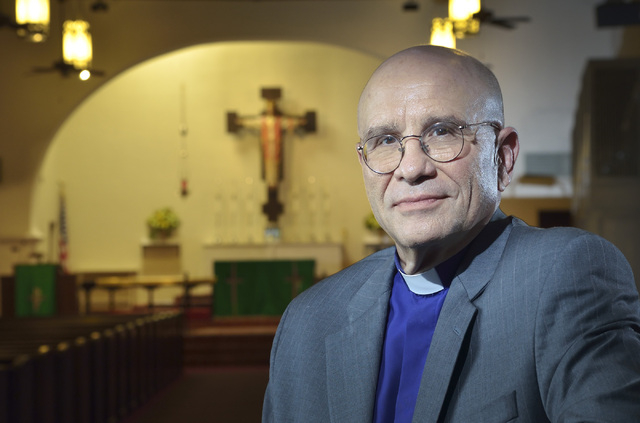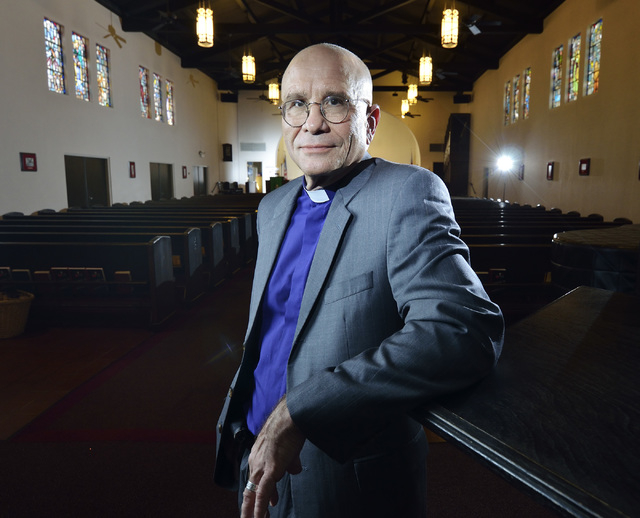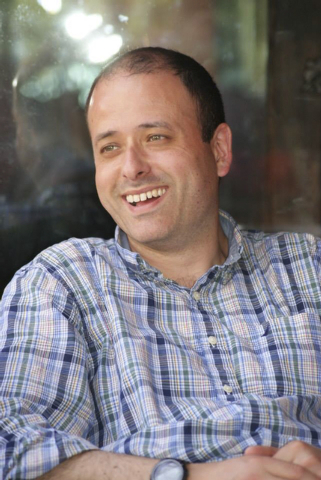Faith leaders search for encouragement too
When the Rev. Albert Felice-Pace was a campus pastor at the University of Arizona, Tucson, in the 1990s, he would email parishioners his “thought of the day,” short passages mainly culled from Scripture that contained words of inspiration and solace.
He didn’t expect much, just to be a small whisper in their busy lives if they had a moment, even a few seconds, to click and contemplate.
But as time went on, students started forwarding the uplifting verses to parents and friends and, for many, the bite-size doses of reflection became part of their daily lives.
Eventually, he had more than 1,200 recipients, and this was before the days of Facebook friends and Twitter followers.
“People are still seeking. They like to have something to uplift them. … We live in this world of wars and hate and Ebola and all these things are going on, so they feel some comfort in the words,” said the Dominican priest and director of St. Thomas Aquinas Catholic Newman Center at the University of Nevada, Las Vegas.
Words of inspiration and wisdom, even the abridged “aha” versions that suit our busy culture, are meant to push us on, soothe the soul. In these times, the world seems particularly eager to grasp at anything that resonates.
We decided to ask local religious leaders, the experts you might say, about the words they cling to in their own lives, whether during times of need or for daily encouragement.
What became clear is they have doubts and struggles like the rest of us, even days when the world seems to be crumbling beneath their feet. Yet, there are passages, sayings, verses, that lead them back to their spiritual moorings time and time again.
WORDS OF HEALING
For Bishop Dan Edwards of the Episcopal Diocese of Nevada, the words of his faith were not always a source of healing, it took time.
Before becoming a pastor, Edwards was a practicing attorney who, based on his experiences, came to realize the world was a “far darker place than I had imagined it to be,” he said.
“I was at that point in my life trying to get through basically by wrapping despair around my shoulders like a shawl and just believing if you don’t have any hopes, you won’t have any disappointments.”
Trying to grasp at something, he started reading the collection of devotions and Scripture used in the Episcopal Book of Common Prayer. They were words he didn’t necessarily believe in, but with time phrases such as “born anew to a living hope” from the Apostle Peter finally started to cut through his disillusion like a “scalpel,” he recalled.
Today, there are verses both from the prayer book and Scripture in general that are constants in his life. One is from the prophet Isaiah, which begins, “Surely it is God who saves me, I will trust in Him and not be afraid.”
“That is a prayer that I have prayed at various times in my life when I was in deep trouble and things seemed to be falling apart, so I prayed it at those times quite desperately,” he said.
He also turns to the First Epistle of John because it reminds him that despite all of our messy imperfections, humans are still loved by God and a continual work in progress “toward something beautiful,” he said.
Looking outside of the Scriptures has been a way to find solace, too.
While researching his book, “God of Our Silent Tears,” (Cathedral Center Press, 2013), Edwards read the works of everyone from academic theologians to Russian novelist Fyodor Dostoyevsky as a way to address the issue of suffering in the world and come to terms with it in a personal way.
In the end, he learned that “God … joins us in struggling against evil, injustice and suffering by giving us serenity, compassion and the power to make things different,” he said.
FINDING THE JOY
The Rev. Marta Poling-Goldenne of New Song Lutheran Church in Henderson has leaned on the meaning of her own “go-to” verses more than ever during the past several months.
In May, her husband, the Rev. David Poling-Goldenne, the church’s lead pastor, was diagnosed with mesothelioma, lung cancer caused by his exposure to asbestos decades ago while working on construction cleanup crews as a teen, according to Marta.
“We have really had to live the words of wisdom that we have shared with people throughout 30 years of ministry this year, in a big way,” she said. In fact, the pair eventually resigned their positions from the church, with Marta’s last appearance in early December.
There are passages that hold particular resonance for her, ones that are a reminder that God is a source of strength and protection. She points to the Book of Psalms, particularly chapters 28, 46 and 91. She is also leaning on Scripture such as Romans 8 and the Apostle Matthew’s words that remind her to trust that “God’s going to take care of you,” she said.
And one particular psalm, with the words, “The joy of the Lord is my strength,” has been a reminder to find the moments of hope that reveal themselves even during the hardest of times. She gives the example of the “joy” found close to home.
During her husband’s illness, Marta has seen her daughter’s faith deepen substantially, she said. The 26-year-old teacher has been meeting up with her dad in the mornings before school and walking with him, as well as her grandmother, around the block while they pray.
One day they walked around the block seven times.
“The days that I find I’m spiraling down in an unhelpful way into grief, I remind myself that God gives me strength, and if I rely on God’s strength then I’m gonna be able to find joy even in the midst of the trials of the day,” she said.
PASSION AND PURPOSE
The idea of community, that it’s vital to stay connected to one another especially in a transient city such as Las Vegas, is something Rabbi Malcolm Cohen brings up a lot to his congregation at Temple Sinai in Summerlin.
There are, in fact, plans to have the words of Jewish philosopher Martin Buber painted above the sanctuary’s Holy Ark: “All real living is meeting.”
“Basically, in difficult times, when things get complicated, it’s just going back to relationships … between you and the important people in your life, between you and the congregants, and it usually brings everything into sharp focus. I think that’s really important and it informs everything I do,” he said.
The words Cohen turns to often reflect the idea of coming together. They include the verses from Hebrew prophets such as Amos who espouse social justice and “rail against people just caring about their own corner of the world,” he said.
He also points to a book by Brad Hirschfield, “You Don’t Have to Be Wrong for Me to Be Right,” which touches upon the reality that differing opinions are what make us human.
“It’s an idea which helps me in my personal life and my work life, and particularly in times like these where everyone’s polarized and they can’t deal with the fact that people have different opinions to them,” he said.
No matter the words, there must be passion behind them, he added. Knowing their meaning is one thing; bringing them to life is another.
Psalm 100, which talks about serving God with energy and joy, is something he returns to over and over. He also noted that in the Jewish tradition, the parchment of the Torah scroll is thought of as “white fire,” while the letters written on it are “black fire.”
“I think in religious life, it shouldn’t be cold or clinical. … Interpretation is very important, but also that we feel very passionate and fiery about the teachings,” he said.
GOD HAS A PLAN
In ministering to college students, whose lives are often so cluttered with classes, work and family, Felice-Pace will often refer them to a verse from the Prophet Isaiah: “For my thoughts are not your thoughts, neither are your ways my ways,” declares the Lord.
They are words he has turned to many times during his 46 years of campus ministry, the idea that no matter how much we plan for the future, sometimes God has his own ideas.
Felice-Pace chuckles when he thinks of the times he has been ready to move to a new ministry assignment and then been told he is going somewhere else.
“Man proposes and God disposes. In other words, God has a plan and things happen, and you realize, this is what God wants for me,” he said.
As a member of the Dominican Order, reading the Psalms of David are a daily ritual, he noted, but there is one in particular that he turns to as a constant source of comfort.
“There’s a verse that I rely on, ‘The Lord is my refuge, the Lord is my strength …,’ and those words, ‘refuge’ and ‘strength,’ are, to me, always on my mind, because even if I am in the dumps, I will go and pray, and pray that God will help me — that is my refuge. And then I realize that what I do is because of the grace of God, the strength that God gives me to face various situations,” he said.
SHARED MEANINGS
Inside the home of Gard Jameson, chair of the Interfaith Council of Southern Nevada and a teacher of Chinese philosophy at UNLV, there is a set of three desk calendars with wisdom sayings for each day of the year.
The calendars, his own creation, include one devoted to Western spiritual thought, one to Eastern thought, and a third that is filled with lines of poetry. It is a world seen through the perspective of everyone from the father of Taoism, Lao Tzu, to St. Francis of Assisi and poet Emily Dickinson.
The verses are an everyday reminder that core values such as faith, joy, wisdom and peace cross boundaries no matter one’s religious beliefs or practices, he said.
“I think words have a power of healing, a power of wisdom, a power of communion that are absolutely essential … (I created the calendars) with the hope that people begin to see through the dogma and the belief to a set of values that people share in common,” he said.
Flip to one particular day in July, a day under the category of “service,” and the sayings in the three calendars read as follows: “When a needy person stands at your door, God himself stands at his side” (Judaism); “Compassion does away with the distinction between self and other … ” (Buddhism); and “Everything that lives, lives not alone, nor for itself” (poet William Blake).
Jameson believes that words and how we use them are vital, including the ones we turn to for a sense of what’s going on in the world.
He points to a book called, “Thriving in the Crosscurrent: Clarity and Hope in a Time of Cultural Sea Change,” by James Kenney, a leader in the movement for interreligious understanding. The book views the world as being caught right now between a secular, materialistic mindset, and a kind of spiritual awakening that brings a new wave of hope and faith, he said.
Words, their intention and clear expression of that hope and faith, will help “get us through the storm,” he said.

























